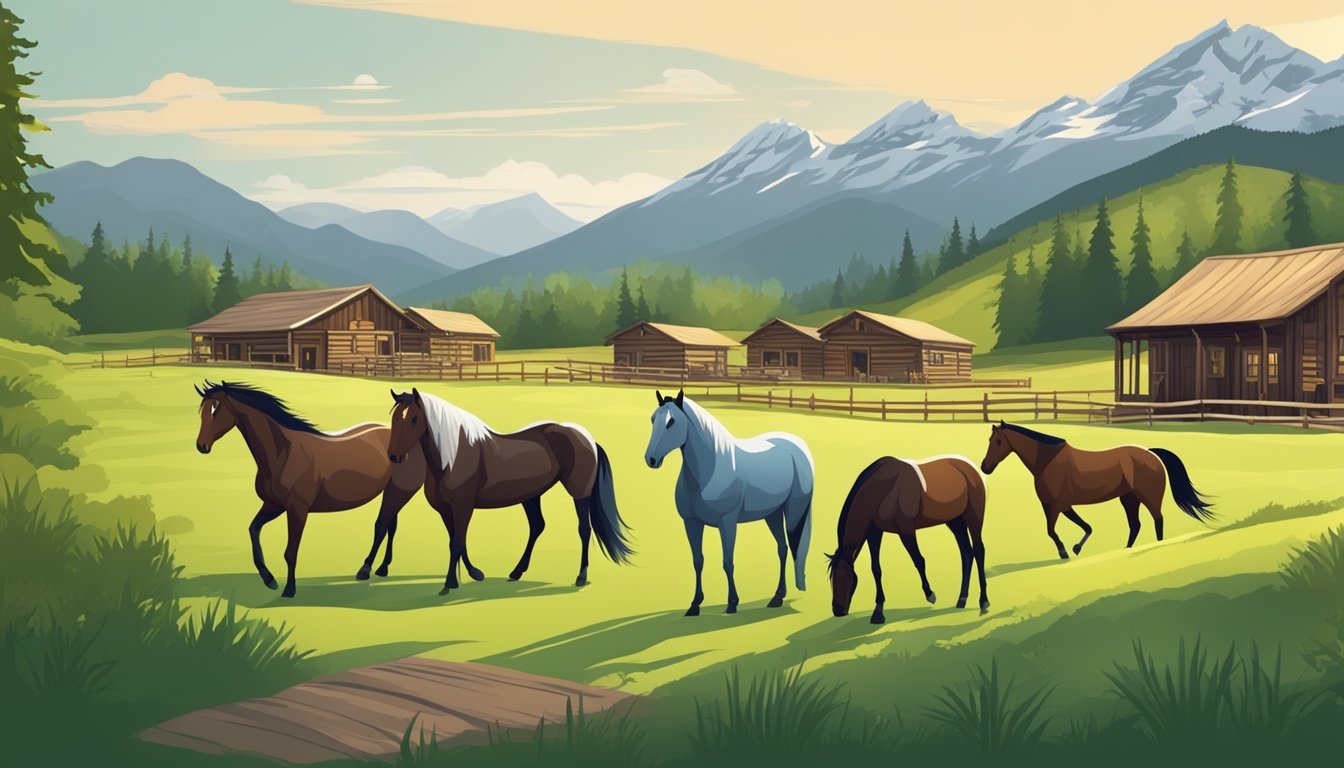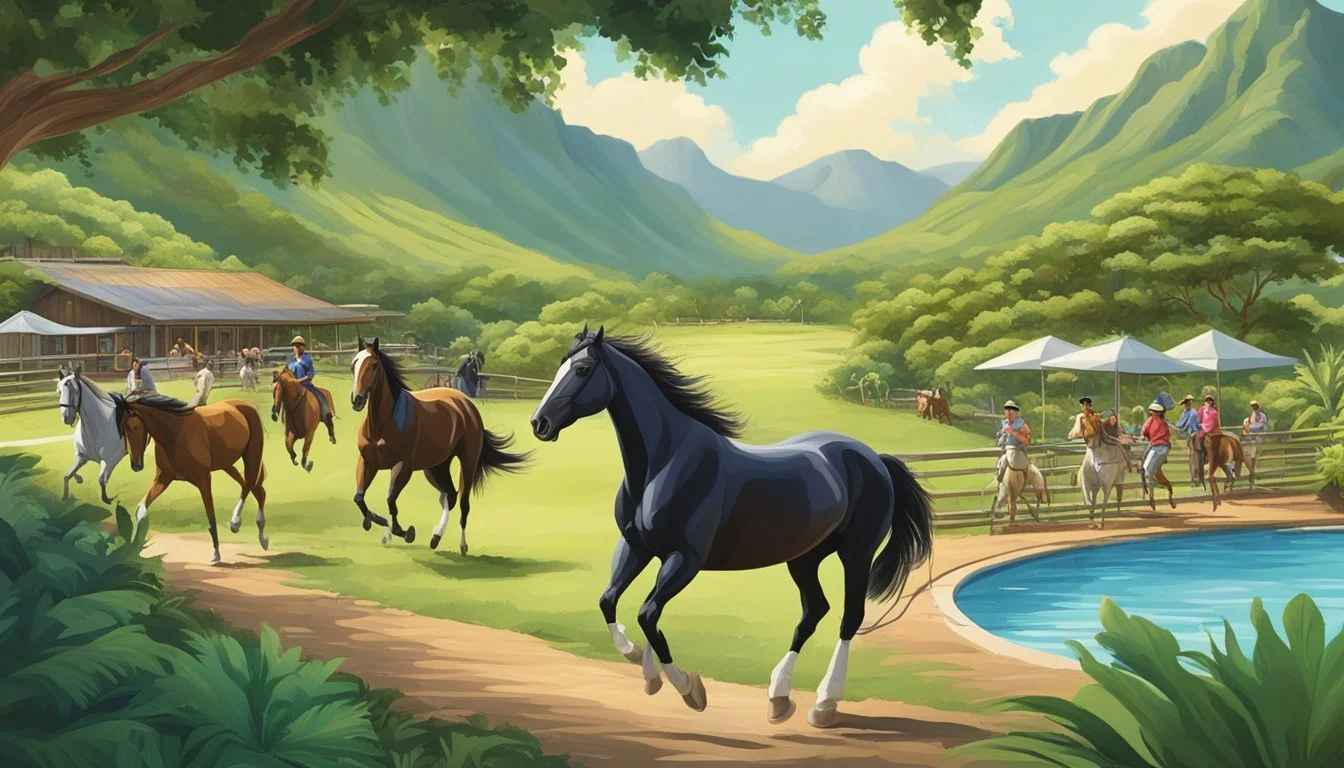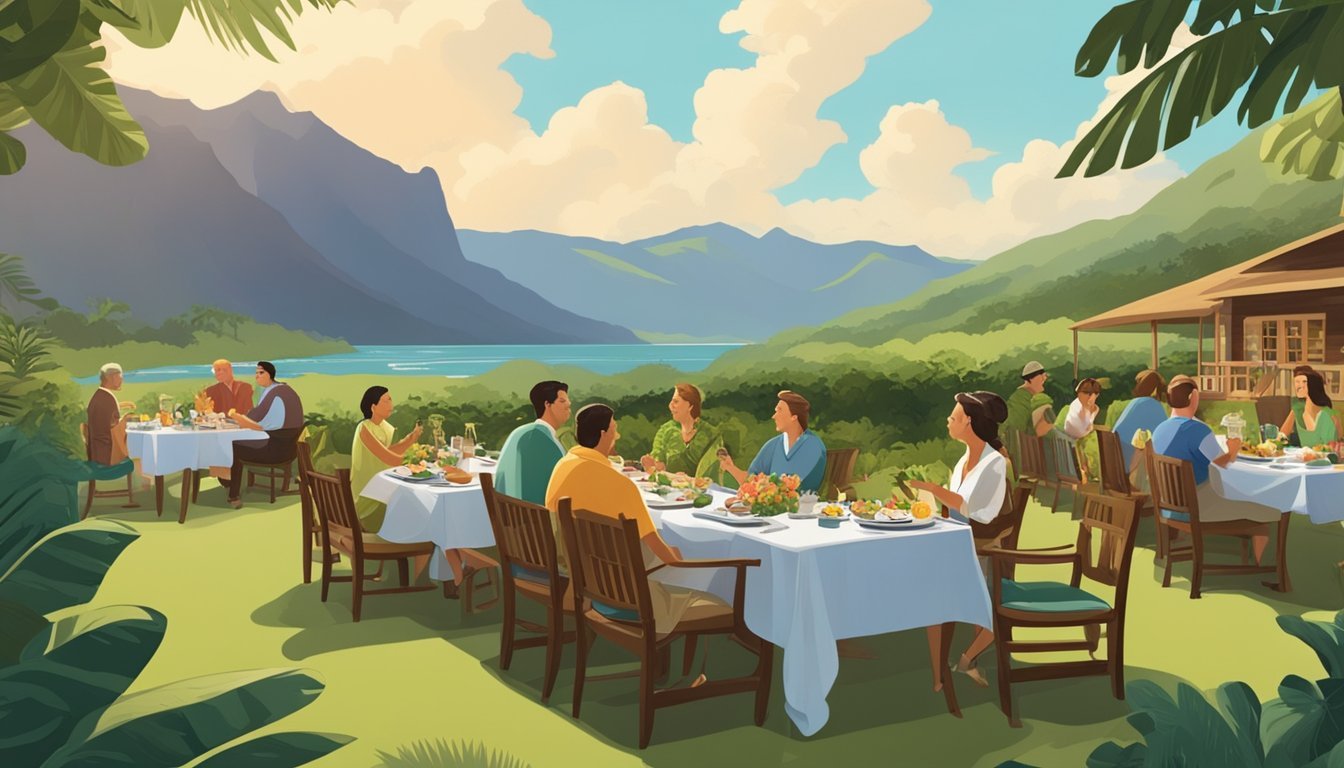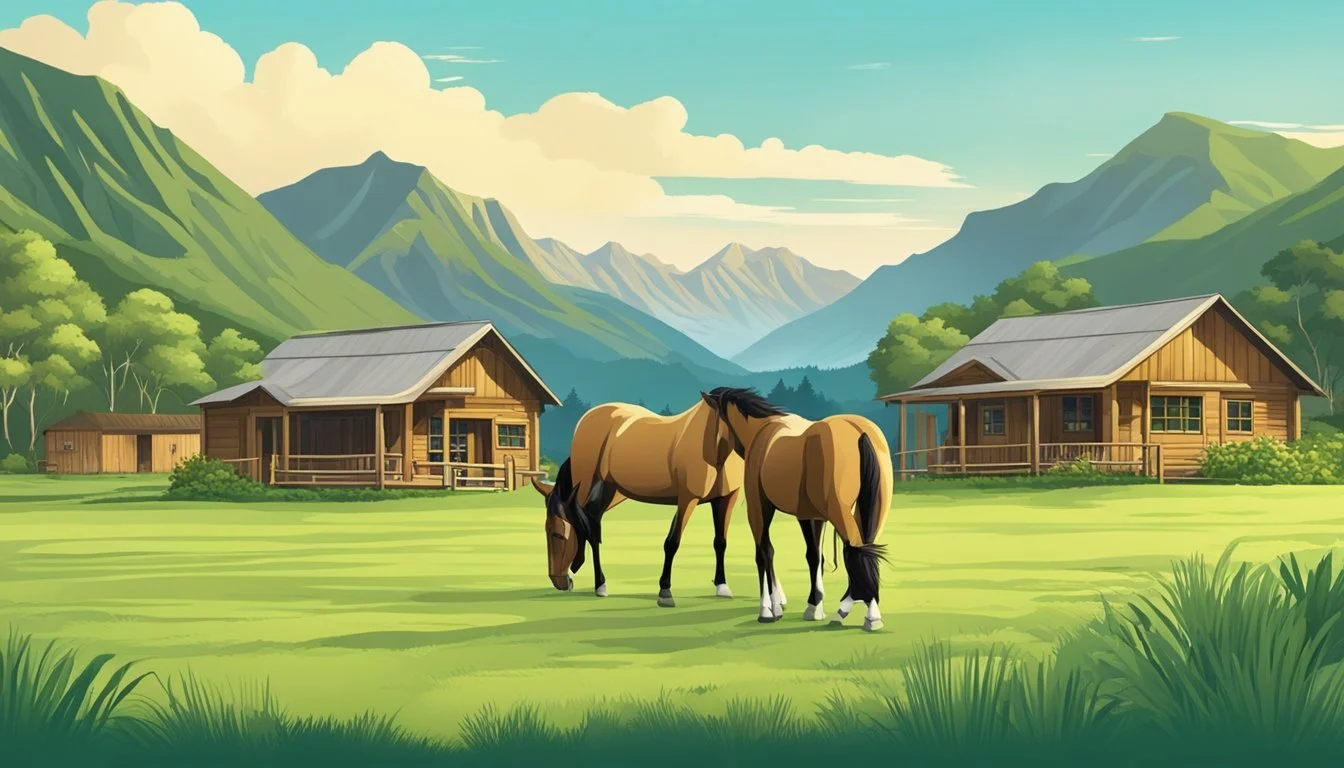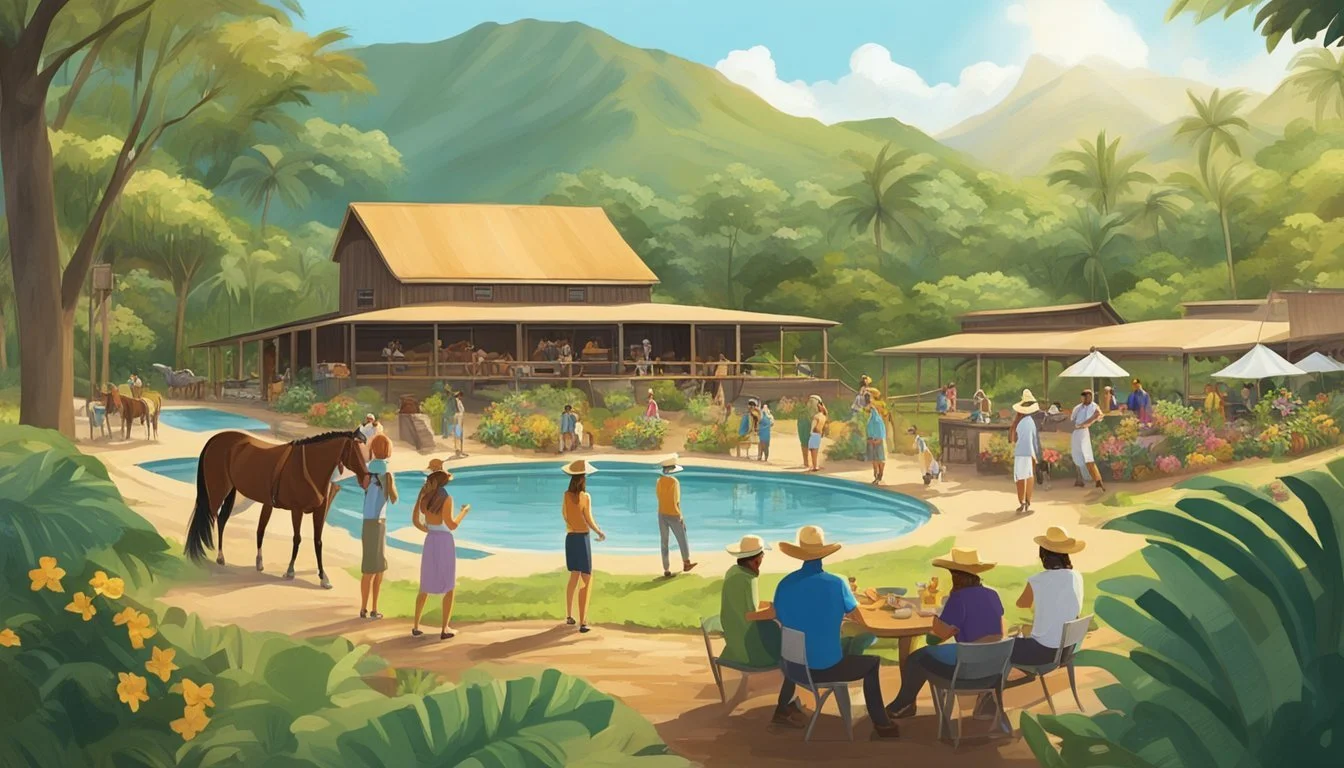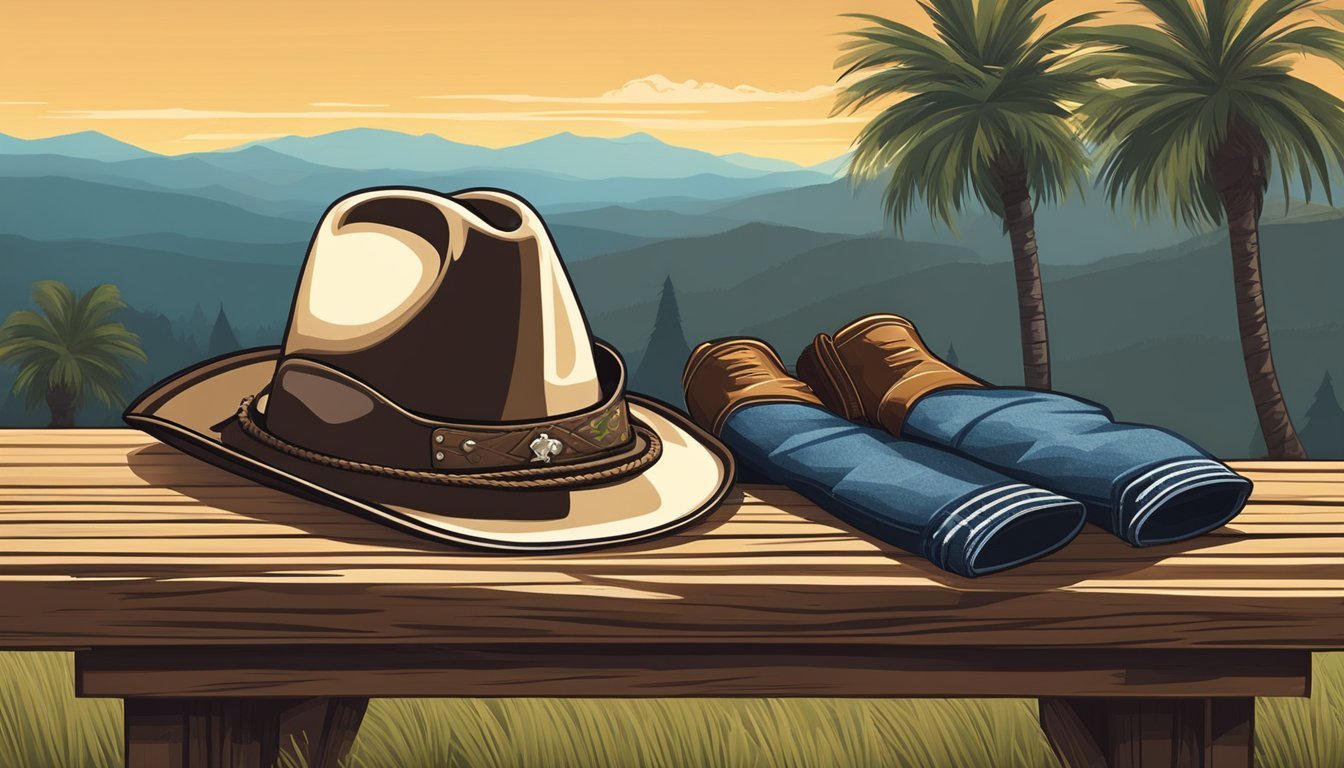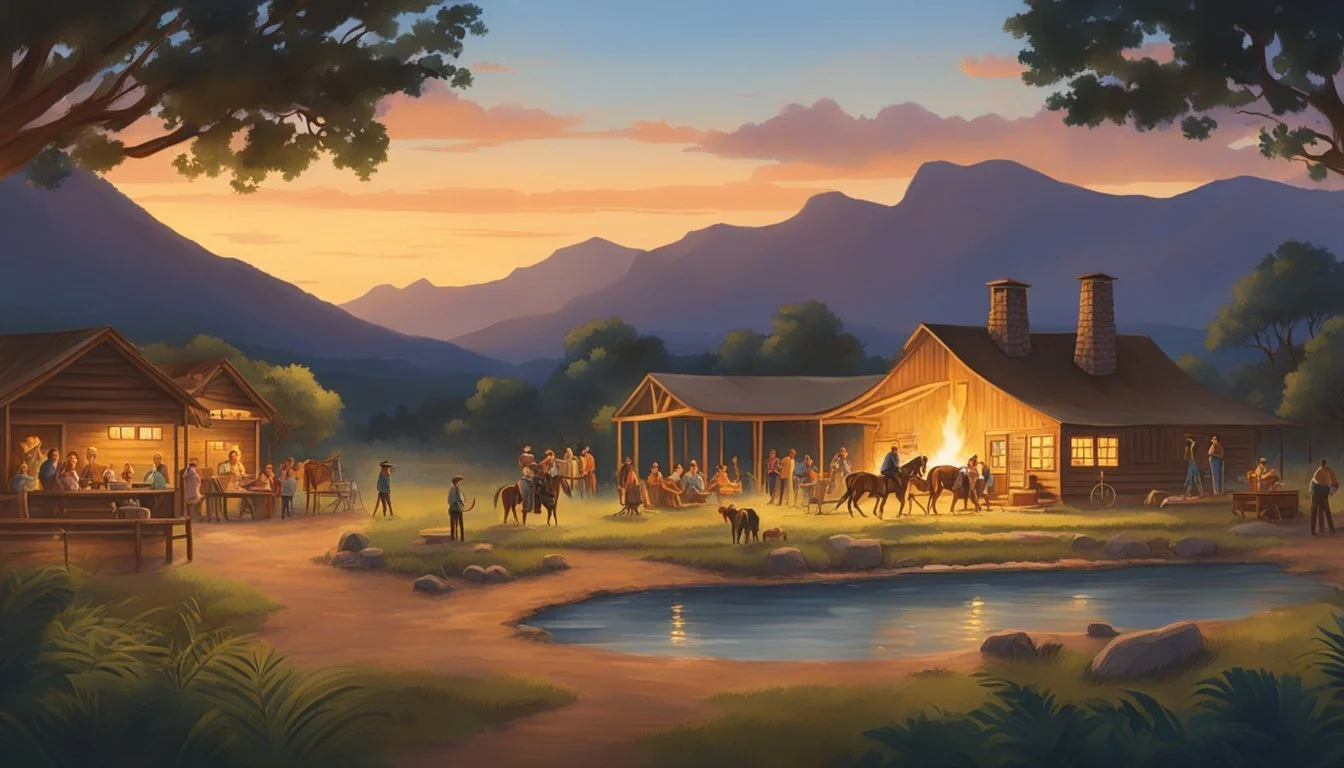Dude Ranches in Hawaii
Your Guide to Island Cowboy Experiences
Dude ranches in Hawaii offer a unique opportunity to experience the Aloha State's diverse landscapes and rich cultural heritage from the saddle. These ranches provide guests with an immersive experience in the cowboy traditions of the islands, blended with tropical allure and the warmth of Hawaiian hospitality. From riding through lush forests and open ranges with views of the Pacific to engaging in authentic paniolo, or Hawaiian cowboy, activities, these ranches cater to travelers looking to combine adventure with relaxation.
Across the Hawaiian Islands, from the volcanic slopes of the Big Island to the scenic coastlines of Maui, dude ranches vary in size and the experiences they offer. Visitors can choose from family-owned operations that have been running for generations or opt for larger, resort-like ranches with an array of amenities. Whether one prefers a hands-on working ranch experience or a more leisurely horseback ride along stunning trails, Hawaii's dude ranches offer something for everyone.
The immersive nature of these ranches often extends beyond horseback riding, with opportunities to participate in daily ranch operations, explore local history, and enjoy Hawaiian cuisine. This integrated approach allows guests to truly disconnect from their everyday lives and connect with the land and spirit of Hawaii, creating memories that last far beyond their stay.
History of Dude Ranching in Hawaii
Dude ranches in Hawaii, also referred to as "Island Ranching," reflect a unique blend of traditional ranching practices infused with the Aloha spirit. The history of ranching in the Hawaiian Islands dates back to the early 19th century, intertwined with the arrival of cattle and horses.
The inception of ranching in Hawaii began when Captain George Vancouver gifted King Kamehameha I with cattle in 1793. The monarch placed a kapu (taboo) on the hunting of cattle, allowing their numbers to flourish. By the mid-1800s, the lifting of the kapu led to the establishment of ranching as a significant industry.
Key Milestones:
1832: John Palmer Parker founded Parker Ranch on Hawai’i Island, one of the oldest and most prominent ranches, which later on introduced tourism-oriented activities.
Late 19th Century: Paniolo (Hawaiian cowboys), often of Native Hawaiian, Portuguese, and Mexican descent, became renowned for their horsemanship and cattle handling, contributing to the ranching culture.
Dude Ranching Emergence:
It was the expansive landscapes and unique cowboy culture that set the stage for Hawaii’s dude ranches, where guests could experience the paniolo lifestyle. Unlike their mainland counterparts, Hawaiian dude ranches offered a distinct island twist, blending tropical environment, local traditions, and cattle ranching.
Parker Ranch: Transitioned part of its operation to cater to visitors, offering them a taste of the ranching lifestyle with Hawaiian hospitality.
Local tradition: Ranch activities often include lessons in traditional practices, such as lei making and Hawaiian lore, alongside horseback riding and cattle drives.
Choosing the Right Dude Ranch
When selecting a Dude Ranch in Hawaii, it is essential to consider location accessibility, available amenities, and the types of experiences offered to ensure the ranch meets the traveler's expectations.
Location and Accessibility
Hawaii offers a variety of landscapes, from the rugged terrain of active volcanoes to serene beaches and lush valleys. Accessibility is a key factor; some ranches may be nestled in remote areas offering tranquility but require additional travel time. The most easily accessible ranches are often found on the islands of Maui, Oahu, and the Island of Hawaii.
Maui Ranches: Easily reached via airports in Kahului, Kapalua, and Hana.
Oahu Ranches: Accessible through Honolulu International Airport.
Island of Hawaii Ranches: Served by airports in Kona and Hilo.
Availability: Guest should verify whether the ranch operates year-round or is seasonal to align with travel plans.
Amenities and Facilities
Each ranch in Hawaii offers its unique set of amenities and facilities which can impact a guest's comfort and enjoyment. Prospective visitors should look for:
Accommodations: From rustic to luxurious, confirm lodging preferences are met.
Dining Options: Ensure the availability of meal plans or on-site dining that suits dietary needs.
Recreational Facilities: Check for swimming pools, spas, or other leisure amenities.
Prospective guests should inquire about the ranch's availability of specific facilities to ensure their needs will be fulfilled during their stay.
Types of Dude Ranch Experiences
Dude ranches in Hawaii present diverse experiences based on the terrain and climate of each location. Travelers should consider whether they prefer the dry, warmer areas or the cooler highland regions.
Desert Ranches: Offer heat and arid landscapes with cacti and rugged trails.
Mountain Ranches: Provide cooler temperatures and activities in aspen-filled forests.
Travelers must assess what kind of dude ranch experience aligns with their expectations, such as adventure-focused activities or a more relaxed, retreat-like atmosphere, and ensure the chosen ranch's availability matches their desired vacation dates.
Activities and Adventures
In Hawaii, dude ranches offer a blend of equestrian activities and outdoor adventures set against the backdrop of the islands' diverse and stunning landscapes. Visitors can expect an authentic ranch experience with a tropical twist, creating memorable adventures under the Hawaiian sun.
Horseback Riding Excursions
Horseback riding is at the core of the Hawaiian dude ranch experience. Each ranch provides guests with the opportunity to explore the island's terrain on horseback. Riders of all skill levels can traverse lush trails, access remote vistas, and witness the beauty of Hawaii's natural environment. Notable ranches such as Parker Ranch in Kamuela and Lahaina Stables on Maui have a reputation for guided riding excursions that showcase the islands' unique geography.
Beginner Rides: Designed for those with little to no horseback riding experience.
Advanced Rides: For experienced riders, these may include more challenging terrain.
Family Rides: Suitable for families with children, offering a gentle introduction to horseback riding.
Riding Excursions Include:
Exploration of volcanic landscapes
Beachfront rides with ocean views
Sunset rides for a romantic experience
Outdoor Recreational Activities
Beyond horseback riding, dude ranches in Hawaii provide a host of outdoor recreational activities. Guests may partake in hiking, fishing, swimming, and sometimes even cattle drives. The terrain varies from ranch to ranch, offering a range of experiences, from mountainous climbs to peaceful meadow walks.
Outdoor Activities Offered:
Hiking: Guided treks through valleys and uplands.
Fishing: Catch-and-release in freshwater ponds and streams.
Swimming: In natural pools and waterfalls, often part of the horseback riding trails.
The unique island setting allows visitors to combine traditional dude ranch activities with the natural wonders of Hawaii, ensuring every adventure is laden with the spirit of aloha.
Accommodations and Lodging
Hawaii offers an array of lodging options for those seeking the unique experience of staying on a dude ranch. The accommodations range from rustic to luxurious, catering to a wide spectrum of preferences and budgets. Many ranches provide the essential comforts of free Wi-Fi, private parking, and access to outdoor activities.
Guests can often choose from a variety of rooms, including single bedrooms suitable for couples or larger rooms and cottages that accommodate families and groups. They typically feature en-suite bathrooms and come equipped with comfortable bedding and a charming, often locally-inspired decor. Certain ranches offer additional amenities like free breakfast and pool access, contributing to a more relaxing stay.
For an upscale ranch experience, travelers might opt for lodgings with increased privacy and services such as spas or private terraces. Puakea Ranch, for example, occupies a historic property with guest cottages over a sweeping landscape that provides ocean views— a testament to the unique combination of history and comfort offered.
Most properties list their availability online, allowing prospective guests to book their stay well in advance. Prices may vary with the season and the type of accommodation chosen, and travelers are encouraged to check for the most updated information directly with the ranches. Here is a list of highlighted ranches providing different accommodation experiences:
Starseed Ranch: Offers freebies like Wi-Fi and parking, with the additional provision of a terrace and garden.
Royal Kona Resort: Noted for its excellent reviews, known for its amenities and prime location.
Hilton Waikoloa Village: A more extensive resort area featuring a range of facilities, including pools and dining options.
Each ranch aims to deliver an authentic Hawaiian ranch experience, combining the spirit of aloha with the comforts of home.
Dining Options
When visiting dude ranches in Hawaii, guests can expect a variety of dining experiences that reflect the diverse culinary heritage of the islands. Most ranches offer a blend of traditional American ranch fare and local Hawaiian cuisine, ensuring a unique dining experience.
Meal Plans and Settings:
Community Dining: Many ranches serve meals in a communal setting which encourages social interaction.
Private Dining: Some offer private dining options for those seeking a more intimate experience.
Outdoor Meals: Guests can often enjoy outdoor dining with views of the Hawaiian landscape.
Cuisine Types:
Local Hawaiian Dishes: Such as poke, lomi-lomi salmon, and laulau.
Continental Cuisine: Often available for guests preferring familiar dishes.
Special Dietary Needs: Ranches usually accommodate vegan, vegetarian, and gluten-free diets upon request.
Typical Menus Include:
Breakfast: A selection of fruits, pancakes, eggs, and traditional Hawaiian breakfast items.
Lunch: Lighter fare, including salads, sandwiches, and local fish.
Dinner: Hearty meals featuring beef, pork, or seafood along with fresh vegetables and an array of side dishes.
Special Culinary Events:
Luaus: Some ranches host traditional Hawaiian luaus, complete with a kalua pig and hula dancing.
Cookouts: Outdoor cookouts are common, offering a rustic and enjoyable dining atmosphere.
Guests should inquire with their chosen dude ranch for specific dining options and meal plans available, as well as any potential additional costs for special dining events.
Cost Considerations
When planning a vacation to a Dude Ranch in Hawaii, prospective guests should consider both the extensive range of prices and what these rates typically include. It's crucial to understand both the baseline costs as well as additional charges that might arise due to seasonal fluctuations.
Price Range and Inclusions
Prices for a dude ranch vacation in Hawaii may vary widely depending on the ranch, its amenities, and the experiences offered. Generally, individuals might expect to spend from $400 to over $1,000 per person, per day. These rates usually cover:
Accommodation
Three meals per day
On-site activities (e.g., horseback riding, mountain biking)
Ranches might also offer special packages that can include additional services like guided excursions or educational programs.
Seasonal Pricing Fluctuations
The cost of a stay at a dude ranch can also fluctuate based on the seasonality of travel to Hawaii. Peak tourist seasons may see higher prices due to increased demand. Guests should consider planning their trips during off-peak times for potential savings. However, guests must also be aware that certain activities or experiences may be limited outside of the peak travel windows.
Booking Tips and Best Practices
When planning a stay at a dude ranch in Hawaii, the booking process is crucial for ensuring the ultimate ranch experience. Availability can be limited, especially during peak seasons, so potential guests should book well in advance. Below are some tips and best practices for booking a dude ranch in Hawaii:
Book Early: Secure your spot by booking several months ahead, particularly if you aim to travel during peak vacation periods.
Room Preferences: Consider the type of accommodation that suits your needs—whether it's a rustic cabin or a luxurious guesthouse with an ocean view.
Consideration for Families and Individuals:
For families, look for ranches offering family-friendly activities.
Individuals should inquire about the range of activities, keeping in mind that one doesn't need to be a horse enthusiast to enjoy a ranch stay.
What to Inquire:
Ask about inclusive activities such as horseback riding, hiking, and fishing.
Check whether meals are included and if there are dining options or meal plans available.
Cancellation Policies:
Be aware of the ranch's cancellation policy and any potential fees.
Consider travel insurance to mitigate unforeseen circumstances.
Contacting the Ranch:
Don't hesitate to contact the ranch directly for specific questions.
They can provide details on the best times to visit, what to pack, and personalized recommendations.
Table of Ranch Considerations:
Consideration Details to Confirm Activities Inclusive and additional costs Amenities Free Wi-Fi, pool, parking Location Proximity to areas of interest Transportation Access to/from the ranch
By adhering to these tips, travelers can confidently book their ideal Hawaiian dude ranch experience, tailored to their preferences and expectations.
What to Pack for Your Dude Ranch Vacation
When embarking on a dude ranch vacation in Hawaii, travelers should be equipped for a variety of activities and weather conditions. The following list encapsulates the essentials.
Clothing:
Jeans: Sturdy denim for horseback riding
Long-sleeved shirts: To protect from the sun and brush
Light layers: For changing temperatures throughout the day
Jacket or Sweater: For cool evenings
Rain Gear: To stay dry during unexpected showers
Footwear:
Boots: With a heel and smooth sole for riding; rentals may be available
Boot Socks: Tall enough to comfortably wear with boots
Accessories:
Hat: Broad-brimmed for sun protection
Sunglasses: UV-protection is key
Sunscreen: High SPF to shield from sun exposure
Insect Repellant: To ward off unwanted insects
Other Essentials:
Camera: To capture memories; don't forget chargers
Swimsuit: In case your ranch has a pool or you partake in water activities
A Good Book: For relaxation during downtime
Travelers should also consider the specific activities offered at their chosen dude ranch and pack accordingly. For instance, if hiking is on the agenda, appropriate hiking shoes and gear would be necessary. Water bottles, backpacks, and binoculars can enhance the experience when exploring the natural beauty of a Hawaiian ranch.
Responsible Ranching
Hawaii's dude ranches actively engage in practices that uphold environmental stewardship and community engagement, setting a standard for responsible ranching in unique ecosystems.
Environmental Sustainability
Dude ranches in Hawaii, such as Kapāpala Ranch, have integrated cattle herding with natural habitat protection. They maintain access roads for hiking trails and manage land use to support ecological balance. For example, cattle grazing is used as a tool to prevent invasive species from overtaking native plants. This symbiotic relationship between ranching and land care ensures that visitors can enjoy Hawaii's scenic landscapes while the ranches contribute to preserving the local flora and fauna.
Key Practices:
Controlled grazing to manage invasive species
Maintenance of access roads for ecotourism
Protection of watersheds and soil conservation
Community Involvement
The ranches are a hub for local culture, with properties like Huehue Ranch hosting community gatherings and preserving traditional practices. They invite generational knowledge-sharing, where local families and cowboys can pass on their roping skills and ranching heritage. This engagement promotes a sense of belonging and helps maintain the cultural fabric of Hawaii's diverse communities.
Community Initiatives:
Hosting local events to strengthen community bonds
Educational programs on ranching history and skills
Support for local economies through employment and tourism
Testimonials and Reviews
Visitors at Hawaiian dude ranches often share glowing reports of their experiences. Travelers commonly praise the family-friendly atmosphere and the inclusive experience that dude ranches offer. For example, guests at Puakea Ranch in Hawi highlight the ranch's welcoming vibe, with one reviewer stating, "You come as a stranger and leave as part of the family."
Ranch Name Review Highlight Puakea Ranch, Hawi "Excellent service and unforgettable experiences" Island of Hawaii Ranches "Stunning views, perfect for family getaways" Maui Ranches "Activities for all ages with warm hospitality"
The ranches across Hawaii's various islands – from Maui to the Island of Hawaii – consistently receive praise for their amenities like free Wi-Fi, breakfast included, pools, and free parking, which contribute significantly to the comfort and convenience of guests' stays.
Feedback often commends the scenic backdrops, with one visitor at Deep Canyon Guest Ranch in Montana extrapolating this sentiment, describing it as having "breathtaking views" - a quality shared by many establishments in Hawaii.
Ranch accommodations are regularly described as comfortable, and the addition of modern conveniences ensures a seamless blending of authentic ranch life with contemporary needs. Families, in particular, appreciate the balance of outdoor activities and relaxation opportunities that cater to all ages.
In summary, reviews of Hawaii's dude ranches are testimonies to their successful combination of natural beauty, hospitality, and activity-filled itineraries that together create memorable vacations.
Safety and Insurance
In Hawaii's unique setting, dude ranches must prioritize safety for guests and employees. A variety of outdoor activities ranging from horseback riding to hiking means having the right insurance coverage is crucial.
Key Insurance Coverages for Dude Ranches:
General Liability: Essential for protecting against potential injuries or accidents that could occur on the property.
Property Insurance: Covers damage to ranch buildings, guest accommodations, and equipment from natural disasters, which are pertinent given Hawaii's volcanic activity.
Commercial Auto: For ranch vehicles that transport guests and supplies.
Equine Liability: Specific to risks associated with horseback riding and other equine activities.
Risk Management Strategies Employed By Ranches:
Horse Safety Certification: Ensures staff are trained in managing equine-related activities.
Regular Safety Audits: Helps identify and mitigate potential risks.
Guest Orientation Sessions: To educate visitors on safety protocols and proper behavior around livestock.
Ranch owners should consider:
Specialty Activities Endorsements: For unique Hawaiian adventures such as oceanfront horseback riding or mountain treks.
Weather-Related Coverage: Given Hawaii's susceptibility to severe weather patterns.
Staying abreast of safety regulations and maintaining comprehensive insurance protects both the guests and the longevity of the dude ranches in the Aloha State.
Traveling to Hawaii
When planning a trip to the magnificent Hawaiian Islands, one should consider the varied transportation options available for reaching and navigating the islands.
Transportation Methods
Air Travel: Visitors typically reach Hawaii by air. Major airports in Hawaii are located on the principal islands, including Honolulu International Airport (HNL) on Oahu, Kahului Airport (OGG) on Maui, Lihue Airport (LIH) on Kauai, and Kona International Airport (KOA) and Hilo International Airport (ITO) on the Island of Hawaii.
Island Airport Code Noted Airports Oahu HNL Honolulu International AIrport Maui OGG Kahului Airport Kauai LIH Lihue Airport Island of Hawaii (Big Island) KOA Kona International Airport Island of Hawaii (Big Island) ITO Hilo International Airport
Inter-Island Travel: For hopping between islands, inter-island flights are readily available, with carriers such as Hawaiian Airlines providing frequent connections.
Local Transport on Arrival
Upon arrival, visitors have multiple options to navigate around the islands.
Rental Cars: Rental cars are a popular choice, offering flexibility to explore the islands at one's own pace. Most major rental agencies have locations at the airports.
Shuttles, Taxis, and Ride-Shares: Shuttle services, taxis, and ride-sharing options such as Uber and Lyft are readily available, providing convenient transport to accommodations and attractions.
Public Transportation: Public buses are an affordable way to travel, particularly on Oahu with 'TheBus'. Other islands also offer limited bus services.
By understanding these transportation methods, travelers are well-prepared to embark on their Hawaiian adventure, reaching the stunning dude ranches and other attractions with ease.
Legal Considerations
Navigating legal considerations is paramount for visitors and potential owners of dude ranches in Hawaii. This section provides essential information regarding visa requirements and ranch regulations.
Visa Requirements
Visitors: Individuals traveling to Hawaii from another country will need to comply with U.S. visa policies. For most tourists and short-term visitors, this will entail obtaining a B-2 Tourist Visa unless they are from a Visa Waiver Program country.
Visa Waiver Program (VWP): Travelers from VWP countries may enter Hawaii without a visa for stays of 90 days or less, provided they have an approved ESTA.
Ranch Workers: Non-residents looking to work at a dude ranch will typically require a specific work visa, such as an H-2A visa for temporary agricultural workers.
Ranch Regulations
Zoning Laws: Prospective owners must adhere to Hawaii's zoning laws, which determine the type of activities permitted on agricultural land.
Land Use Permits: Acquiring land use permits is often necessary and can be a complex process involving county and state land regulations.
Operational Compliance:
Animal Welfare: Ranches must observe animal welfare laws, ensuring the humane treatment of horses and other livestock.
Business Licensing: Operating a dude ranch requires appropriate business licenses issued by Hawaiian authorities.
Environmental Considerations:
Dude ranches must also comply with environmental regulations aimed at preserving Hawaii's natural beauty, such as water usage restrictions and waste management requirements.

